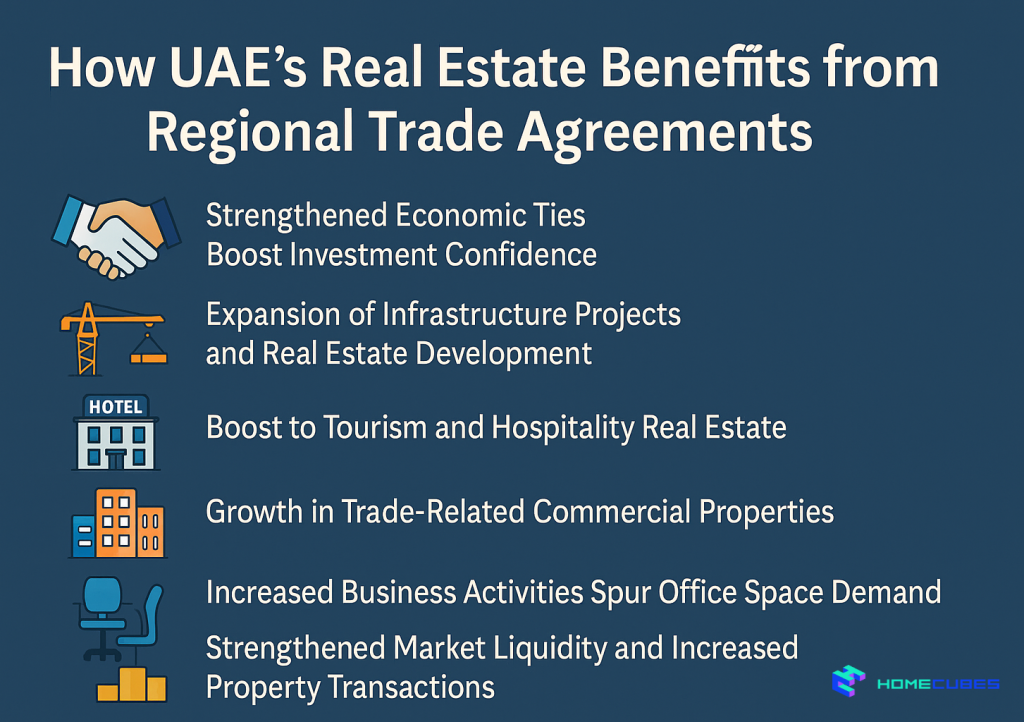

Introduction: The Power of Trade Agreements in UAE’s Real Estate Market
Trade agreements are more than just formal treaties between nations; they are pivotal economic tools that stimulate growth, enhance bilateral relationships, and open doors for international collaboration. In the case of the United Arab Emirates (UAE), these agreements have become instrumental in its rise as a global economic powerhouse. Situated at the crossroads of Asia, Europe, and Africa, the UAE’s strategic location has made it a vital trade and logistics hub, attracting investments and fostering economic development across various sectors, including real estate.
The UAE has actively pursued regional trade agreements to bolster its position as a center for business and trade. By enhancing access to international markets, improving economic cooperation, and creating business-friendly policies, these agreements directly benefit the UAE’s real estate market. From boosting demand for residential and commercial properties to spurring the development of infrastructure, trade deals have facilitated an environment conducive to real estate growth and investment.
The UAE’s foreign trade has reached a historic milestone, touching AED 3 trillion for the first time by the end of 2024.
My brother, His Highness Sheikh Mohammed bin Zayed, has spent years strengthening economic ties with nations worldwide… Today, we see the results.
While…
— HH Sheikh Mohammed (@HHShkMohd) February 5, 2025
Furthermore, regional trade agreements such as the Gulf Cooperation Council (GCC) Free Trade Agreement, agreements with neighboring countries like Saudi Arabia, and initiatives such as the Belt and Road Initiative (BRI) have made the UAE even more attractive to international investors. These agreements have laid the foundation for the UAE’s robust real estate market, helping it flourish despite the challenges posed by global economic uncertainties.
In this article, we explore the Trade Agreements Benefits that contribute to the continued success and expansion of the UAE’s real estate sector, particularly how they boost investor confidence, enhance infrastructure, and drive demand in both commercial and residential properties.
Regional Trade Agreements Benefits for UAE Real Estate Market

1. Strengthened Economic Ties Boost Investment Confidence
One of the Regional trade agreements benefits is that it fosters stronger economic ties between the UAE and its neighboring countries. As these agreements enhance bilateral trade, they lead to increased foreign investment in various sectors, including real estate. International investors view trade agreements as a sign of stability and predictability in the economy, making the UAE a favorable destination for capital inflow. For example, the UAE’s relationship with GCC (Gulf Cooperation Council) members has been vital in enhancing investor confidence in the region.
The increase in foreign investment directly impacts the real estate market by driving demand for both commercial and residential properties, offering opportunities for developers and investors alike.
2. Expansion of Infrastructure Projects and Real Estate Development
Trade agreements often come with promises of expanded infrastructure development, which is one of the major benefits for real estate. Through agreements such as the UAE-Saudi Arabia cooperation, the country has been able to invest significantly in infrastructure projects like airports, ports, highways, and railways.
Infrastructure improvements increase the accessibility of prime real estate, making properties more attractive to both businesses and residents. For instance, the ongoing development of the Etihad Rail network, which is a result of regional cooperation, is expected to spur demand for properties along its route, creating new real estate hotspots across the country.
3. Boost to Tourism and Hospitality Real Estate
Another trade agreement benefits is that it stimulates tourism by making travel and trade between countries more seamless. This is particularly beneficial to the UAE’s hospitality real estate sector. As the UAE strengthens trade ties with countries in the Middle East and beyond, the number of business and leisure tourists increases, leading to a growing demand for hotel accommodations, serviced apartments, and other tourism-related properties becoming one of the trends shaping UAE real estate rental yield in 2025 and beyond.
For example, the UAE’s agreements with China under the Belt and Road Initiative (BRI) have resulted in a notable increase in Chinese visitors to the country, driving demand for short-term rental properties and hotel rooms. These agreements contribute to the expansion of the hospitality real estate sector and provide developers with valuable opportunities.
4. Growth in Trade-Related Commercial Properties
Comparing commercial vs residential real estate investment, comes up with several advantages associated with commercial real estate, when the economy is growing. Regional trade agreements have a direct impact on the demand for commercial properties in the UAE. As countries sign trade deals, the flow of goods and services increases, requiring more office spaces, warehouses, logistics hubs, and retail outlets. The UAE’s position as a key trading hub has resulted in high demand for commercial properties across the country.
For example, agreements like the GCC Free Trade Agreement and UAE’s growing relations with the East African region have led to a sharp rise in the demand for industrial and logistics real estate, especially around ports such as Jebel Ali. This demand for commercial real estate reflects the UAE’s growing role as a logistics and distribution center.
5. Increased Business Activities Spur Office Space Demand
As trade agreements open up markets, they also facilitate the entry of new businesses and international corporations into the UAE. The increased economic activity from foreign businesses and their expanding operations directly impacts the demand for office space. This trend is evident in key commercial districts like Dubai International Financial Centre (DIFC), Business Bay, and Abu Dhabi Global Market (ADGM), where high-end office spaces are in demand.
Regional trade agreements enhance the ease of doing business between the UAE and its neighbors, making it more attractive for businesses to set up regional headquarters and operations within the country. As more multinational corporations enter the UAE market, the demand for prime office spaces continues to rise, further strengthening the commercial real estate sector.
6. Strengthened Market Liquidity and Increased Property Transactions
The final trade agreement benefit is that it fosters a more open and liquid real estate market. As trade deals improve the ease of doing business, they also encourage property transactions by both local and foreign investors. With streamlined regulations, better access to financing, and a more investor-friendly climate, regional trade agreements enhance the liquidity of the UAE’s real estate market.
This increase in market liquidity means properties can be bought and sold more easily, attracting a broader range of buyers and investors. As regional trade deals encourage more capital inflow, they also support the UAE’s position as a safe haven for international real estate investments.
Conclusion: The Positive Impact of Trade Agreements on UAE Real Estate
Trade agreements have proven to be a significant driver of growth and opportunity for the UAE’s real estate market. By strengthening economic ties, driving investment, enhancing infrastructure, stimulating tourism, and creating demand for both residential and commercial properties, these agreements have made the UAE’s real estate sector one of the most attractive in the region.
Looking forward, the UAE’s active participation in regional trade agreements will continue to shape its real estate landscape. With increased liquidity, better infrastructure, and an influx of foreign investments, the UAE is poised to further solidify its position as a global real estate hub. For investors, this represents an exciting opportunity to tap into a rapidly growing market, bolstered by strong regional ties and international trade cooperation.
🏢 Explore Innovative Real Estate Investment with Homecubes
At Homecubes, we’re committed to providing forward-thinking investment solutions in the UAE’s dynamic real estate market. Our platform is designed to offer seamless access to prime property investments, leveraging technology and market insights to empower investors.
Please note: Homecubes is currently awaiting regulatory approval from the Virtual Assets Regulatory Authority (VARA) and is not offering investment services at this time.
📩 Stay Informed: Contact us to receive updates on our platform launch and learn how Homecubes plans to redefine real estate investment in the UAE.









